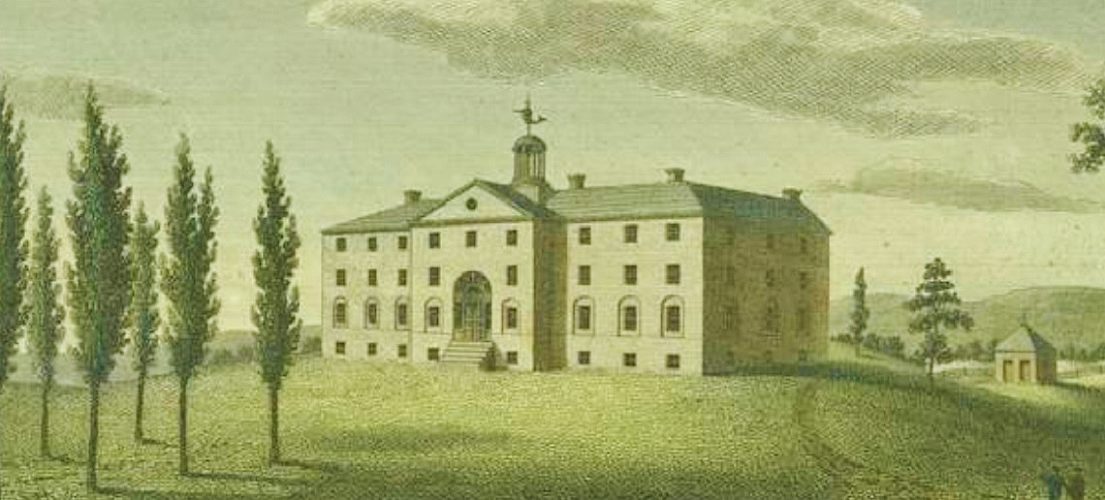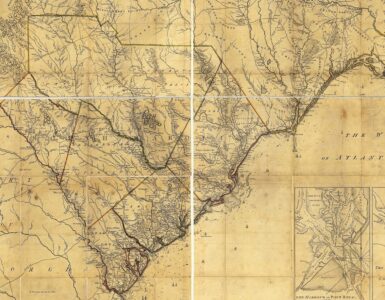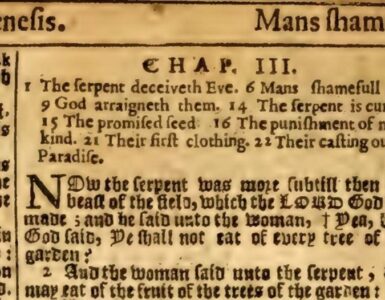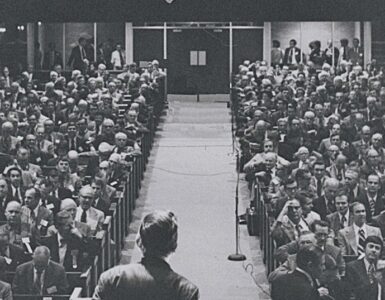John was born December 5, 1740 in Chestnut Level, Lancaster County, Pennsylvania, to Ann (McLaughlin) and Robert King. Robert had emigrated from Ireland and purchased a tract of land which he farmed, and he was an elder in the Chestnut Level Presbyterian Church. At the age of thirteen, John began formal studies in a local grammar school which included Latin and Greek, logic, metaphysics, and moral philosophy, and he was catechized in doctrine by Irish-immigrant Pastor Sampson Smith. When it was time for college studies his father was unable to provide tuition, so John taught school in West Conococheague, Cumberland County, for about three years. The word Conococheague refers to near-by Conococheague Creek.
Enrolment in Master King’s school declined and he needed a different job, so he returned to his hometown in 1764. He was twenty-four years old and his future was yet to be settled as he contemplated his options. While growing up his parents had provided religious instruction and while teaching in Conococheague he joined the communion of the church. He was interested in becoming a minister but believed he could not pastor because his voice was weak, and his speech was further inhibited by chronic hoarseness during winter. It may be difficult to understand how important a strong voice was for preaching then when in the present age electronic amplification makes the weakest whisper into a baritone blast, but a strong voice was important. Benjamin Franklin commented that George Whitefield’s sermons could be heard from a good distance when he preached to crowds numbering in the thousands in the squares of Philadelphia. King’s vocal limitations turned his focus from ministry to medicine and he went to Philadelphia to study with Dr. John Boyd. King was not impressed with Boyd’s medical knowledge which was in fact nothing but apothecary science. He tried again to study medicine when he turned to Dr. Kearsley in Philadelphia and had nearly made up his mind to study with him when Thomas McGee, a former teacher, encouraged him to consult with Francis Alison, vice provost of the College in Philadelphia (University of Pennsylvania). Alison convinced King to pursue the ministry and encouraged him to begin studies in May 1765. After a year’s residence he was awarded the Bachelor of Arts in May 1766.
When he left college, King returned home and applied himself to studying theology with the pastor of the Chestnut Level Church as he began trials for the ministry in his presbytery. He was licensed to preach August 13, 1767. The succeeding fall and winter he supplied the church in New London, Pennsylvania, but then after paying a visit to the Upper West Conococheague Church he was offered a call which was accepted. Donegal Presbytery ordained and installed him August 30, 1769. The membership of the church included one-hundred-thirty families. The village was a small one, but King’s church was sizeable and must have had at least 300 individuals distributed among its families.
Within several months of King’s move to Upper West Conococheague Church an incident occurred which would test his commitment to truth. There was a riot in 1770 resulting from the arrest and imprisonment of Col. James Smith who had been charged with murder. A mob from Pastor King’s community went to Carlisle to forcefully get Smith out of prison. In his wisdom, the honorable Col. Smith was able to dissuade the mob and convinced them to return home. Smith’s incarceration continued to cause dissension and violence. Eventually, Col. Smith was exonerated. King’s discourse is included in this biography because now 250 years later the United States has experienced domestic violence, destruction of property, and disregard for the rule of law not only by the non-believing public but also Christians. Courageously, Reverend King addressed his unsettled and divided community.
The distractions which have lately agitated this part of the country, and I am sorry to say, have too much prevailed in this particular settlement, are indeed a matter of no small uneasiness to me, and certainly it must appear a distressing consideration to every one that has any regard to the peace and good order of society, either civil or religious. These are both divine ordinances and as such they claim a universal regard from everyone who is a subject of them. Hence, to observe persons in a riotous manner openly setting themselves against the government and endeavoring by force and arms to prevent the due administration of justice, must be deeply afflicting to every one who pays any respect to the divine authority in this wise and useful institution. Such practices are highly criminal in themselves, not only in a civil, but also in a religious sense. For if civil government is a divine institution, if “the powers that be are ordained of God, then whosoever resisteth that power, resisteth the ordinance of God, and they that resist shall receive to themselves damnation.” These are the express words of the inspired apostle, in Romans 13:1, 2, where he carefully inculcates subjection and other duties which we owe to magistrates. Paul inculcates on Christians the duty of submission even to the heathen governors who ruled at the time when he wrote, and so of consequence, the obligation binds with greater firmness under Christian governors.
The first argument Paul uses for this duty is the divine appointment of it: “For there is no power but of God; the powers that be are ordained of God.” He has, for the good of mankind, assigned different stations of rule and subjection among men, though they are all of one race, raising some above others, and clothing them with such authority whereby they bear some resemblance to himself, and accordingly, he has communicated to them his own name: “I have said ye are gods” (Psalm 82:6); so that we see with what regard God himself speaks of magistrates and judges. He also makes use of that very power in magistracy to curb and punish those who despise it, as a strong obligation to bind us to obedience: “For rulers are not a terror to good works,” &c. (Romans 13:3, 4.). And further, he also adds another, of a higher necessity, that binds more strongly, and is more acceptable, that is, a necessity of conscience: “Wherefore,” says he, “ye must needs be subject, not only for wrath, but for conscience sake.” This is the main consideration, and which is the sum of all the rest; as if he had said: Have a reverent and conscientious respect to the ordinance of God, in the institution of government; and to the providence of God in the choice of those particular persons he calls to the administration of it, and submit yourselves to those who are thus set over you. This you must needs do, and that “not only for wrath, for fear of the magistrate’s sword,” but out of a necessity of conscience, which makes a true willingness and an acceptable service; and where this is done, it produces an agreeable and regular motion among all superiors and inferiors, states and families, magistrates and subjects, the one commanding, the other obeying in the Lord.
We see then that this subjection is a necessary and commanded duty incumbent upon all; and certainly Christians are to consider themselves under the strongest obligations; yea, it is so connected with religion that I can scarcely think of a good Christian person who is not a good civilian. A disposition to oppose, or to abet, or encourage the actual opposition to civil government, is a temper of mind contrary to the spirit of Christ and unbecoming the Christian character. But we are still to remember that this subjection is not to infringe upon the rights of conscience, with respect to the authority and law of God, and the duty we owe to him; for the extent of all these relations and of all subjection and obedience is to be bounded by the unalterable obligations we are under to God, as supreme: “Render therefore unto Caesar the things that are Caesar’s” (Luke 20:25), but nothing of God’s, that is neither ours to give, nor his to receive. The law of God is the first and highest rule and binds all, both kings and subjects, high and low, under inviolable and perpetual engagements. Magistrates and judges are peculiarly under the eye of God, and as he has elevated them to a higher station than others, so he peculiarly takes notice of their conduct as the Supreme Judge; God sits and views their proceedings, not only whether they do that which is just, but whether they judge righteously for conscience sake. They are accountable to God, and also to the laws of the land, if they go beyond their trust.
But should they leave their station, it affords no argument for us to leave ours. No, if opposition should arise to such a height as to require responding opposition, which may sometimes happen in any government, such opposition ought to be made in a quiet, peaceable, and lawful manner, and not by force of arms, tumults, and riots, and the like. This is choosing the worst way, for no other reason but because it is the worst; for oppression itself will not justify opposition by force, until all milder measures have failed—much less is it justifiable when the circumstances of the case do not require it.
Upon the whole, then, as I conceive it my duty to reprove sin, in whatever light it appears, and as I am convinced that resisting a divine ordinance is sin, and that the disgraceful conduct of the late rioters deserves that character, I conceive that no upright and well-disposed mind can take offence at what I have declared concerning it. It is a story in the mouths of those who may be called our political adversaries, that the Presbyterians are disaffected towards the government, and that their teachers instruct them so, and thus, though it is a charge upon that people in general, yet it comes indirectly upon the ministers. And therefore I take this occasion publicly to declare my abhorrence and detestation of such riotous conduct, and most earnestly exhort and warn all those that hear me to abstain from it, and to avoid all those who do by any means encourage practices so destructive to the peace and good order of society—nay, so reproachful to human nature.
Even though John King suffered from a weak voice, his words are powerful and courageous as he directly addressed disrespect for the authority of the government.
For the last six years of King’s life he was severely afflicted with rheumatism, nevertheless he continued in the Upper West Conococheague Church until he retired in September 1811. His affliction caused enough weakness in his last days that he often preached seated. John King passed away July 15, 1813. During his ministry 950 people were baptized and 480 were admitted as communing members. He was survived by his wife Elizabeth who was the daughter of one of the church’s elders, John McDowell. They married April 2, 1771. John and Elizabeth had no children. He is buried in Church Hill Graveyard and the following is inscribed on his headstone.
As a tribute of respect to the memory of Rev. John King, D.D., upwards of forty-two years the able, learned and faithful pastor of the congregation of Upper West Conococheague, whose life exhibited the beauty of holiness, whose death declared the triumph of the cross, this monument is erected by the grateful children of his pastoral care.
John King was honored when he was elected moderator of the Fourth General Assembly of the Presbyterian Church in the United States of America during its sessions in First Church, Carlisle, Pennsylvania, 1792. The following year Moderator King delivered his sermon from 2 Corinthians 5:18, “And all things are of God, who hath reconciled us to himself by Jesus Christ, and hath given to us the ministry of reconciliation.” The subjects for retiring moderator’s sermons at the Assembly meetings sometimes involved obtuse and strained texts, but there is no doubt what King was concerned about—reconciliation. The Trustees of Dickinson College honored John King with the Doctor of Divinity in 1792.
His extant publications include—Observations on the Prophecies which Relate to the Rise and Fall of Antichrist and Such as Appear to Point to the Events of our Times: With Some Calculations on Prophetical Members, to Show that his Fall May not Now be Far Off, Chambersburg: Printed by George Kenton Harper 1809; A Catechism, on the Evidences of the Christian Religion for the Benefit of Young People, Gettysburg: Printed by Robert Harper, 1803; A Serious Address upon the Subject of the Prevailing Vice of Drunkenness, Carlisle: Printed by Kline and Reynolds, 1786. He also wrote an article for a Presbyterian periodical on the subject of a man marrying his deceased wife’s sister.
Barry Waugh
Notes. The header image is Dickinson College in Carlisle, 1811, and it is from the New York Public Library Public Domain Digital Collection. Information on John King’s mother’s identity was found in the Find-A-Grave entry for him. Sprague has King’s date of death as July 5, 1811, which is incorrect given the date of M’Knight’s memorial service was August 1, 1813. The date in Centennial Memorial of the Presbytery of Carlisle, vol. 2, 1889, is July 15, 1813, which fits the situation best given the author of King’s biography in Centennial Memorial quoted the inscription on his grave marker, he would have also seen the vital dates on the marker. However, dates are sometimes incorrect on grave markers (as with my own grandfather). Alfred Nevin’s History of the Presbytery of Philadelphia, and of the Philadelphia Central, 1888, and his, Churches of the Valley: or, An Historical Sketch of the Old Presbyterian Congregations of Cumberland and Franklin Counties, in Pennsylvania, 1852, were both used; the discourse about Col. Smith was transcribed from Churches of the Valley. The Presbyterian Historical Society has in its Pearl Digital Collections an eight-page letter from Benjamin Rush to John King, April 2, 1783. Also consulted was General Alumni Catalogue of the University of Pennsylvania, compiled by W. J. Maxwell, and published by the University Alumni Society, 1917. The book, History of the Presbyterian Church of Upper West Conococheague now Mercersburg, Franklin County, Pa., 1877, by Thomas Creigh was helpful. John McKnight published, Two Discourses Occasioned by the Decease of the Rev. Doctor John King: Late Pastor of the Congregation of Upper West Conococheague: Delivered … August 1, 1813, Chambersburg: Printed by G.K. Harper 1813.





